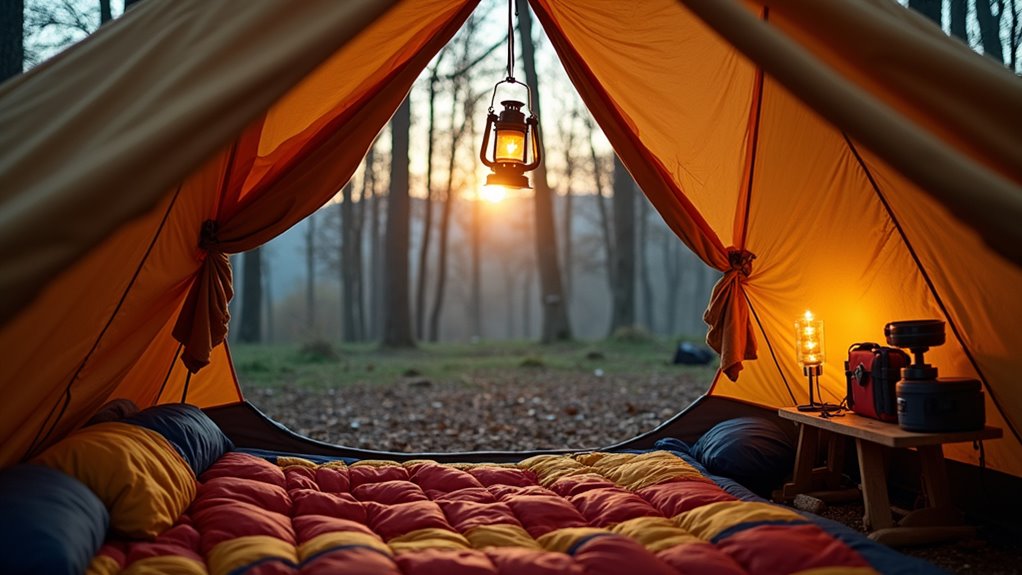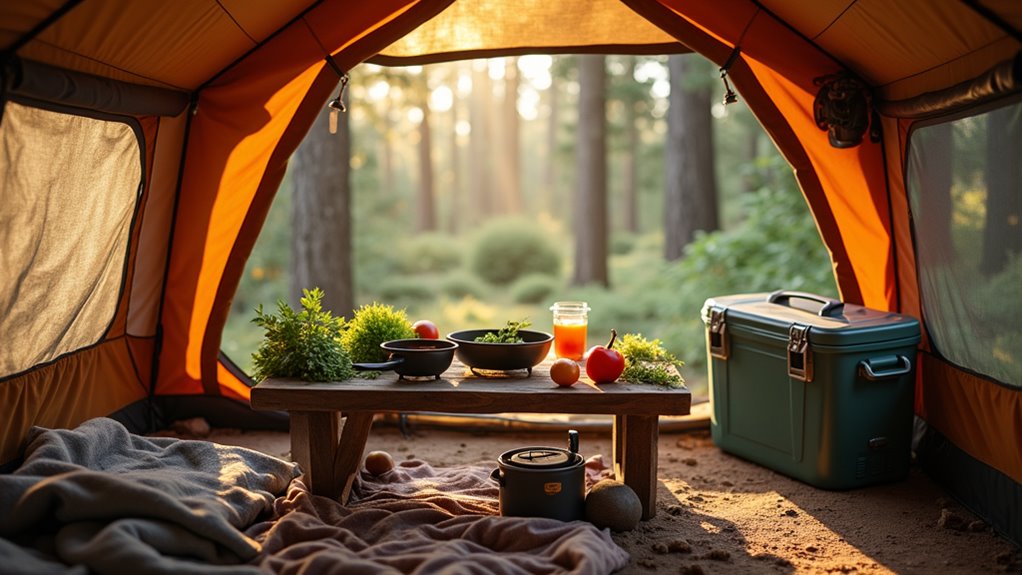What To Take Camping In A Tent
This post contains affiliate links. As an Amazon Associate, we earn from qualifying purchases.
When camping in a tent, it’s essential to pack a durable tent with sturdy stakes, a suitable sleeping bag, and a portable camp stove. Additionally, bring reliable lighting like headlamps, safety gear including a first aid kit and multi-tool, moisture-wicking clothing, sturdy hiking boots, and basic toiletries. Comfort items such as chairs or blankets can also enhance your experience. Further details and tips on what to take will be provided later in the article for those seeking more in-depth guidance.
Essential Facts in 30 Seconds
- Choose a durable tent that fits your group and use a footprint to protect the floor.
- Bring a portable stove or grill, cooking utensils, and sturdy cookware.
- Pack lighting such as headlamps, flashlights, and lanterns with extra batteries.
- Wear moisture-wicking layers, waterproof jackets, and strong hiking boots.
- Include items for activities like games, nature scavenger hunts, and materials for storytelling or stargazing.
Shelter & Sleeping Gear
A good shelter and sleeping gear make camping better. Pick a tent that fits your group and lasts long. A lightweight dome tent works well for most trips. Use a footprint to keep the tent floor dry and safe from damage. Strong aluminum poles and solid stakes keep your tent steady. Understanding tent types can help you choose the best option for your trip.
Sleep warm with a bag made for the night’s temperature. Add a sleeping pad for comfort and to block cold from the ground. Foam or inflatable pads work fine. Bring a small pillow to support your neck. It helps you sleep better.
Carry extra blankets or liners if the weather is wet. Choosing the right tent size ensures you have enough space for everyone and their gear. Comfort and protection help you rest well under the stars.
Lighting & Safety Equipment

Good lighting and safety gear make camping safe and fun. Headlamps and flashlights help you see at night without using your hands. Carry extra batteries to keep them working.
Lanterns, powered by batteries or fuel, light up your camp area. Waterproof matches and fire starters are lifesavers in emergencies. It’s also important to have safety precautions in mind when using heating sources.
Bring a fire blanket and a small extinguisher to control fires quickly. Keep buckets of water or sand nearby to put out campfires completely.
A first aid kit must have bandages, antiseptic wipes, and emergency blankets for injuries.
Carry an emergency whistle and insect spray for your safety. Keep your phone or GPS device charged for help if needed.
Know the local emergency numbers before you start camping. This careful planning keeps your trip safe and enjoyable. Additionally, consider bringing tent heaters to stay warm, but always prioritize safety when using them.
Cooking & Food Preparation

Cooking outdoors requires the right gear. A portable camp stove or grill cooks food quickly.
Keep food fresh with good storage containers. Use pots and pans that work well on a camp stove.
Bring utensils for cooking and eating. Pack cleaning tools to wash dishes easily.
These items make outdoor cooking simple and fun.
Essential Cooking Equipment
Camping is fun. Good cooking tools make it better. A camp stove is a must. Lightweight stoves work well for hiking. Bigger stoves with more burners suit car camping.
Use the right fuel. Propane and white gas last long and burn well. Cookware should be strong. Stainless steel and cast iron handle high heat. Bring two pots with lids and a frying pan. A Dutch oven cooks many meals.
Don’t forget cooking tools. Spatulas, tongs, knives, and a cutting board help a lot. These items make cooking easy and tasty outdoors.
Food Storage Solutions
Good food storage makes camping safer and more enjoyable. Bear canisters work best in areas with bears. Their hard shells stop animals from reaching your food.
Campgrounds often have metal bear boxes. Use them to store food, trash, and toiletries safely. Clear plastic bins with tight lids help keep food fresh and prevent spills. Stack these bins to save space in your tent or car. Label each container clearly.
Keep all food outside your tent to avoid attracting animals. Store food in coolers or bear boxes during the day. Follow local rules to stay safe and protect wildlife.
Meal Preparation Tips
Meal preparation can make camping easier and more fun. Plan meals that need little work at the campsite.
Write down all ingredients and tools for each meal. Chop vegetables and cook parts at home to save time. Use resealable bags for stews or marinated meat.
One-pot meals cut down on cooking and cleaning. Bring light cookware and enough fuel for your stove. Keep cold foods fresh with ice packs.
Following these tips helps reduce hassle and food waste. Your camping meals will taste better and need less effort.
Clothing & Personal Gear
Right clothing and gear can make camping more fun and safe. Start with underwear and T-shirts that wick away sweat. They stop you from feeling wet and prevent skin irritation. Long-sleeved shirts protect you from the sun and bugs. Wear long pants or shorts depending on the weather. Thick wool or synthetic socks keep feet warm and dry.
Bring layers for changing weather. A waterproof jacket helps in rain. A fleece jacket warms you at night. Choose strong hiking boots for rough trails. Sandals work well around the camp. Consider bringing a first aid kit to address minor injuries or ailments while outdoors.
Keep a small toiletry kit with a toothbrush, soap, and a quick-dry towel. Use insect repellent and sunblock to guard your skin. Sunglasses shield your eyes. A backpack carries all your gear comfortably. Remember to check for hazards like falling branches that may pose risks while camping.
Good clothes and personal items boost comfort and safety on your trip. Simple choices make a big difference outdoors.
Tools & Repair Equipment
Having the right tools and repair gear matters a lot in the wild. Carry a multi-tool with a knife, scissors, screwdriver, and pliers to fix many things. A sewing kit with strong needles and thread helps repair tents and clothes. Duct tape is great for quick fixes on broken items. Zip ties hold straps or lines tight and secure.
Bring a tent repair kit with patches and seam sealer to keep your tent dry. Timely damage assessment is crucial for identifying issues before they worsen. Regular maintenance ensures a dry and comfortable camping experience and can prevent many issues from arising. Spare stakes, poles, and mesh patches fix tent damage fast.
Pack extra batteries, baling wire, and safety pins for emergencies. These tools and supplies prepare you for any camping problems. Stay ready, stay safe.
Campsite Comfort & Extras
Setting up your campsite with comfort in mind makes outdoor time enjoyable. Foldable chairs and tables add ease to your meals and rest. Portable games and small speakers bring fun after a long day. These extras help create a cozy, lively campsite everyone will love. Additionally, incorporating items like the Haven Safari Hammock Tent can enhance your experience by providing a unique blend of comfort and protection. Consider adding adequate lighting to your setup, as it can create a cozy atmosphere and improve visibility during the evening hours.
Essential Camping Furniture
Crucial camping furniture improves comfort and makes your trip better. Durable camp chairs or light seating pads help you sit easily.
Portable cots lift you off the ground for a good sleep. Hammocks offer a great place to relax near trees or stands.
Camp stools save space and work well for small areas. Multi-use tables serve for meals and activities without picnic tables.
Picnic mats or outdoor rugs make the ground soft and cozy. Lanterns and string lights brighten your campsite and add warmth.
These items boost your camping fun and comfort a lot.
Outdoor Entertainment Ideas
Set up a cozy campsite with strong furniture first. Then, plan fun activities to keep everyone happy. Outdoor games make camping better. They help people bond and create great memories.
Try these ideas:
- Tell stories by the campfire. Ghost tales add excitement.
- Play games like frisbee or badminton. Stay active and laugh.
- Fish by the lake or river. Enjoy calm moments and catch some fish.
- Watch stars at night. Spot constellations and feel close to nature.
Organize group games like a nature scavenger hunt. Take photos of animals and plants too. Visit local music events. They bring culture and fun to your trip.
These activities will make your outdoor stay unforgettable.
Frequently Asked Questions
What Should I Pack for a Camping Trip With Kids?
Bring important camping gear like sleeping bags and portable stoves. Pack simple games, coloring books, and flashlights for kids. These items keep children happy and cozy on the trip. Also, include snacks, water, and first aid supplies for safety. Choose clothes for warm days and cool nights. A small backpack for each child helps them carry their own things. Planning well makes the trip fun and safe for everyone.
How Do I Choose the Right Campsite?
Picking the right campsite makes your trip better. Find spots near clean water for drinking and cooking. Trees or natural shade help keep you cool during hot days. Choose safe areas away from steep cliffs or wild animal paths. Look for flat ground to set your tent easily. A quiet place with some privacy lets you relax and enjoy nature. Easy access to trails or roads saves time and energy. Comfort, safety, and convenience matter most for a fun camping experience.
What Food Should I Bring for Camping?
Pack snacks that give you energy, like bars and nut butter packets. Easy meals help a lot. Bring canned beans, instant oatmeal, and hard cheese. These foods keep well and taste good. You can cook or eat them cold. Stay fueled and enjoy your camping trip.
How Can I Stay Safe From Wildlife While Camping?
Keep a safe distance from all wild animals, especially bears. Store your food in strong containers that animals cannot open. Cook your meals away from your sleeping area to avoid smells attracting animals. Clean up all food scraps and trash right after eating. Make noise while walking to alert animals of your presence. Stay calm and back away slowly if you see wildlife. Respect their space to avoid dangerous encounters. Camping safely means protecting both you and the animals.
What Are Essential Items for Camping in Colder Weather?
Thermal clothing and a warm sleeping bag keep you cozy in cold weather. Use layers to trap heat and stay warm. Insulated pads protect you from cold ground. Wear a hat and gloves to keep heat in. Carry a good flashlight and extra batteries. Drink warm liquids to stay hydrated and warm. Proper gear helps you sleep well and enjoy the outdoors.
Conclusion
Packing the right items makes camping in a tent much better. A good sleeping bag keeps you warm at night. A strong lantern lights up your campsite after dark. Cooking gear lets you prepare tasty meals outdoors. These items boost comfort and safety while you camp. Sitting by the fire, you feel warm and happy. Sharing stories makes the night special. Getting ready well helps you enjoy nature’s beauty. Grab your gear and start your adventure with confidence.
